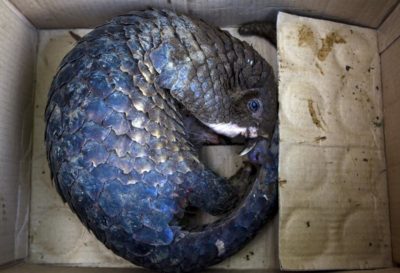
WILDAID
Earlier this month, the 17th Conference of the Parties to CITES (the UN Convention on International Trade in Endangered Species of Wild Fauna and Flora) took place in Johannesburg, South Africa. CITES aims to reduce wildlife trafficking and to ensure that legal trade in wildlife products does not threaten the survival of plant and animal species.
Over 180 member nations as well as NGOs, local groups and the private sector attended the two-week summit. WildAid sent a five-person delegation to work on pangolins, elephants, rhinos, sharks and mobula rays, and to network with partner governments.
Overall, it was a positive conference:
• All eight pangolin species were uplisted to what’s known as Appendix I, which bars international trade. Only Indonesia opposed uplisting for two Asian pangolin species, the Chinese and Sunda.
• Silky Sharks, Thresher Sharks and all Mobula (Devil Ray) species were listed in Appendix II, a designation recognizing that while these species are not yet threatened with extinction, trade must be controlled to prevent further decline.
• The African Grey Parrot, one of the most popular species of parrot in the pet trade, was added to Appendix I.
• A number of rosewood and other timber species were also uplisted.
• Parties to CITES firmly rejected proposals to legalize rhino horn and ivory trade. A resolution to close domestic ivory trade passed, but Japan sought an exemption by claiming its trade did not contribute to poaching or illegal trafficking — despite evidence to the contrary from NGOs.
Meanwhile, attempts to uplist lions to Appendix I were blocked by southern African countries, and although trade in lion bone from wild lions was banned, it continues to be allowed from canned hunts and captive breeding facilities.
Seeing a species uplisted by CITES is always bittersweet. On the one hand, it’s a relief that protection is finally being improved. But such action can come too late, or is an acknowledgement that yet another species is so severely threatened. Appendix II is supposed to ensure that species do not decline to the point of requiring Appendix I, but problems with enforcement and implementation as well as other threats, like habitat loss, often means a total ban is necessary.
While the near-unanimous uplisting of pangolins was a breath of fresh air, the Conference remains sharply divided. A majority of nations believe CITES protection is vital for conservation efforts and wish to focus on improved implementation and enforcement. But a bloc led by South Africa and Japan, and including Namibia, Zimbabwe, Swaziland, Iceland and Zambia, wish to re-open trade in rhino horn, ivory and many other endangered species products, arguing it could generate funds for on-the-ground conservation. Unfortunately, when this was tried with ivory, poaching increased dramatically.
Stay in touch and get the latest WildAid updates.
SIGN UP